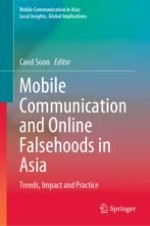2023 | OriginalPaper | Chapter
12. Regulating Online Pandemic Falsehoods: Practices and Interventions in Southeast Asia
Authors : Netina Tan, Rebecca Lynn Denyer
Published in: Mobile Communication and Online Falsehoods in Asia
Publisher: Springer Netherlands
Activate our intelligent search to find suitable subject content or patents.
Select sections of text to find matching patents with Artificial Intelligence. powered by
Select sections of text to find additional relevant content using AI-assisted search. powered by
